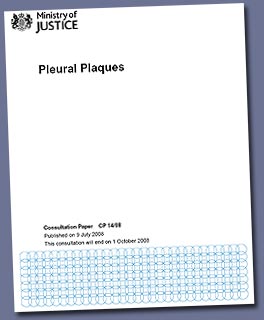The Government launched a consultation this week, following a major court case which resulted in the Law Lords upholding a Court of Appeal decisions which had a massive impact on those suffering pleural plaques.
 The document discusses possible best practice in dealing with people who have developed pleural plaques after being negligently exposed to asbestos at work.
The document discusses possible best practice in dealing with people who have developed pleural plaques after being negligently exposed to asbestos at work.
The medical condition of Pleural plaques is best described as being small areas of fibrosis found within the pleura of the lung caused by asbestos exposure. Opinions may differ on this, but the argument put forward in the courts was that they do not usually cause significant symptoms and are in themselves benign.
They do indicate exposure to asbestos, which for many does go on to cause major illness.
The Ministry of Justice consultation paper totaling 51 pages, says in its introduction:
“This consultation paper considers the Government response to the House of Lords decision in Johnson v NEI International Combustion Ltd and conjoined cases (known at earlier stages as Rothwell v Chemical & Insulating Co Ltd (and conjoined cases).
In a unanimous decision on 17 October 2007, the Law Lords upheld a Court of Appeal decision that the existence of pleural plaques does not constitute actionable or compensatable damage. Pleural plaques are small localised areas of fibrosis found within the pleura of the lung caused by asbestos exposure. On the basis of certain High Court decisions in the 1980s, it was possible for damages to be awarded for negligent exposure to asbestos which had led to the presence of pleural plaques. However, following the decision in Rothwell, this is no longer possible.”
It goes on to detail the intent of the discussion paper:
“The paper considers the law and medical evidence underpinning the House of Lords decision, and indicates that independent reviews of the medical evidence have been commissioned from the Industrial Injuries Advisory Council and the Chief Medical Officer.
The paper proposes that action should be taken to improve understanding of pleural plaques and in particular to provide support and reassurance to those diagnosed with pleural plaques to help allay their concerns.”
It offers a number of ways forward on the issue:
“In light of the representations that have been received from those who are strongly of the view that pleural plaques should be compensatable, the paper considers the issues that arise in relation to changing the law of negligence and invites views on whether this would or would not be appropriate.
It also invites views on the merits of establishing a ‘no fault’ payment scheme for individuals who have been diagnosed with pleural plaques, and looks at two possible approaches. One would be to establish a ‘no fault’ payment scheme limited to those with work related exposure to asbestos and diagnosed with pleural plaques within a fixed period prior to the House of Lords judgment who had not already received compensation. The second would establish a ‘no fault’ payment scheme for all those similarly exposed and diagnosed now or in the future. The paper discusses whether any payment should be made, and – if so – by whom; the amount of the payment; and the risks, benefits and costs of both schemes. “
Compensation is already available for a range of asbestos-related diseases such as mesothelioma, asbestosis, pneumoconiosis and asbestos-related lung cancer.
However, as is becoming more and more obvious with many issues, the disparity in treatment between Scotland and the rest of the UK on health and safety legislation is evident with the Scottish Parliament recently announcing legislation to ensure people with pleural plaques can still make a claim for damages as they give rise to anxiety and signify an increased risk of developing very serious illness as a result of exposure to asbestos.
It is clear that this consultation exercise is a sign that suggests that the UK Government will not follow the lead of the Scottish Government in this matter.
 Justice Minister Bridget Prentice MP says:
Justice Minister Bridget Prentice MP says:
"We understand the concern and anxiety experienced by people who have been exposed to dangerous substances like asbestos, and who have been told they have pleural plaques. The Law Lords have made their decision on legal grounds but those with pleural plaques may still need support. We need to find the best way forward to provide that support.
The Government is committed to consulting on a way forward and welcome views on how people who have been exposed to asbestos, and developed pleural plaques, might be helped. Providing reassurance to people and offering financial support are among the suggestions we are asking for views on."
The consultation period lasts from 9th July until 1st October 2008
The full document can be downloaded here
Source: Ministry of Justice News Release



 Justice Minister Bridget Prentice MP says:
Justice Minister Bridget Prentice MP says: